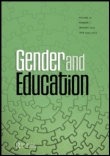 The co-authors of this article have been working together in Sweden (Elisabet Öhrn & Gaby Weiner) and in Scotland (Gaby Weiner & Joan Forbes) for a number of years. The idea for this policy study piece grew from involvement in a project on social and other capitals in independent schooling in Scotland. Gender was found to be significant in/through which capitals resources worked. One school exhibited a ‘traditional’ gender regime, exemplified in its privileging of boys’ sport, boys’ overall confidence and apparent lack of gender awareness among staff; another had an explicit discourse of girls’ high academic achievement and aspiration; a third school encouraged newer, more urbane and ‘sensitive’ forms of middle class masculinities alongside traditional forms of masculinity. We were interested in knowing more about the Scottish gender policy context for that study and how it compared to that of Sweden – another relatively small country on the periphery of Europe.
The co-authors of this article have been working together in Sweden (Elisabet Öhrn & Gaby Weiner) and in Scotland (Gaby Weiner & Joan Forbes) for a number of years. The idea for this policy study piece grew from involvement in a project on social and other capitals in independent schooling in Scotland. Gender was found to be significant in/through which capitals resources worked. One school exhibited a ‘traditional’ gender regime, exemplified in its privileging of boys’ sport, boys’ overall confidence and apparent lack of gender awareness among staff; another had an explicit discourse of girls’ high academic achievement and aspiration; a third school encouraged newer, more urbane and ‘sensitive’ forms of middle class masculinities alongside traditional forms of masculinity. We were interested in knowing more about the Scottish gender policy context for that study and how it compared to that of Sweden – another relatively small country on the periphery of Europe.
Researching for this article led us to understand the impact of education policy shifts and trajectories at European Union (EU), at national and at institutional levels in terms of gender. For example, we found that in Sweden, achievement of gender equality has been used, like its support for politically progressive causes in other places, as a form of cultural and symbolic marker to signal the advanced state of Swedish society, in particular its progressivism, tolerance and humanity. Gender embraces no such cultural symbolic value in Scotland: rather, gender is viewed with suspicion – as a distraction from privileged Scottish narratives of national struggle, social class oppression, religious sectarianism, and more recent ‘One Scotland’ anti-racist discourses.
Our research and writing for ‘Slippage and/or symbolism:…’ has further led us to investigate the methodological and political significance of gender in conducting qualitative research. Thus, we are now focusing on gendered relations in the research field generally; and also – critically – on our research into independent schools, and the significance of gender to both researchers and researched.
Writing this reflection/blog has revealed to us the ways in which our current work has developed from our very early questions about the gendered practices we uncovered in independent schooling. And, importantly, it has reinforced for us the powerful benefits of women academics working together to develop a sustained agenda of research and writing.
Joan Forbes (University of Aberdeen) and Gaby Weiner (University of Umeå/University of Edinburgh)
Joan, Gaby and Elisabet Öhrn (University of Gothenburg) are co-authors of the article ‘Slippage and/or symbolism: Gender, policy and educational governance in Scotland and Sweden’ which will appear in Gender and Education 23.6.
